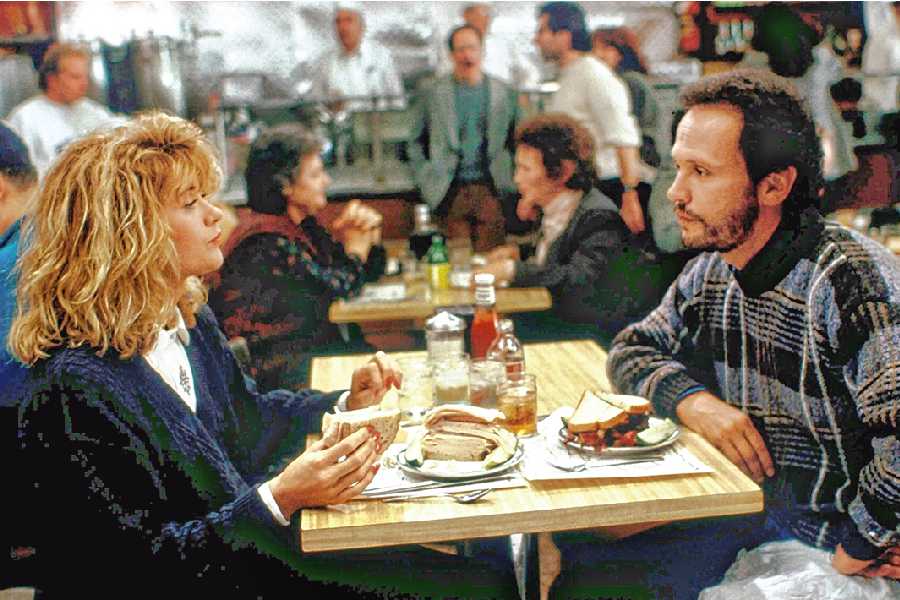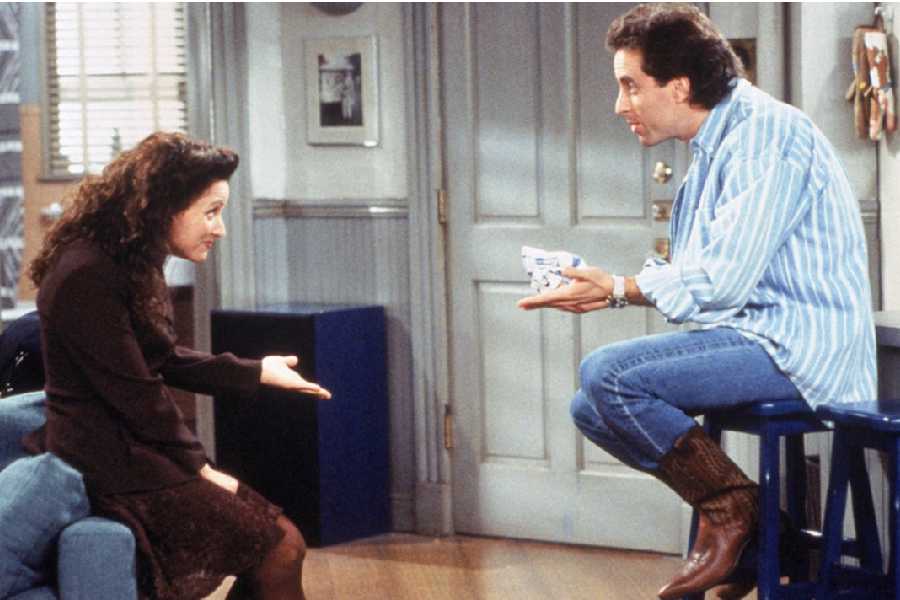In marriage, when you run out of words early morning, there is always the option of making a four-minute egg. You may know the variety, the one in which an egg is placed in cool water, allowing it to come to a gentle boil and after three minutes, you get a four-minute egg. Get a vinaigrette going for drizzling, accompanied by a slice of toast done on one side. Serve. Allow her to process the love until she reaches a satisfying ‘uh-hmm’, complete with a gentle 45-degree nod to go with a set of crinkly eyes.
Then there is platonic love, one in which she arrives at your door uninvited to help you prepare your favourite four-minute egg while discussing ways around marital problems that are eating you up.
Yeah, the second type of love is tough to come by between a man and a woman, something Nora Ephron has drilled into our heads. She was adamant that a man and a woman can’t be ‘just’ friends. She ensured Harry ultimately told Sally after 11 years: “I love it that after spending the day with you I can still smell your perfume on my clothes.”
Platonic love? What’s that in the movie world? Besides a handful of exceptions, it’s been the same story forever. Seth Rogen and Rose Byrne want to change that with oodles of help from show creators Nick Stoller and Francesca Delbanco on the upcoming Apple TV+ series Platonic, which unrolls May 24 onwards.
You can expect laughs, some ohs and some oohs because of the two lead actors. But at the back of their mind is the goal to go beyond the lessons When Harry Met Sally… taught us.
It’s as if we have been extras in this classic 1989 movie, watching the story play out over and over again. Sally is introduced to Harry by a friend and she gives him a ride from Chicago to New York after their college graduation. They passionately debate the issue of whether men and women can be friends without sex. The years roll by and the two keep bumping into each other and then they start hanging out in a platonic relationship, laughs giving way to arguments, jokes turning into debates and eventually a pastrami sandwich does its bit at Katz’s Deli… you know the scene, the one in which Meg Ryan’s Sally tells the world how easy is it for a woman to fake it, ending in one of the most memorable lines in movie history — “I’ll have what she’s having.” Something falls into place within Harry.

In Friends, Lisa Kudrow’s Phoebe Buffay and Matt LeBlanc’s Joey Tribbiani are the best of friends and they share almost every secret with each other
It’s a movie that makes us believe that a man-woman friendship is as rare as “true love”… that most of us can’t have a Joey-Phoebe thing going on. That’s not exactly true, Rogen and Byrne are trying to say. Call it friendship, call it platonic hoo-ah but there are workout “partners” who like being a sweaty mess, there are text-at-weird-hour friends, there are helping-to-swipe-right buddies, and there are exes who learn they make better friends. It’s a relationship where one could throw around a quote that many like to attribute to Cleopatra: “Fool! Don’t you see now that I could have poisoned you a hundred times had I been able to live without you?”

Billy Crystal as Harry Burns and Meg Ryan as Sally Albright in When Harry Met Sally..., a film that said men and women can’t be friends
Beyond a trope
Platonic love is playing hide-and-seek around us but rarely does it become Play-Doh in the hands of Hollywood directors.
“Yeah, old habits die hard. Male-female friendships are kind of not allowed in a lot of cultures; it’s progressive in some ways to show a man and a woman having a platonic friendship, and I think it’s one of those things that’s very intuitive to people because they have these relationships. But movies are always way behind the curve when it comes to showing this stuff,” says Rogen with a full-hearted laugh over a late-late night video call.
“It’s like a trope (to show men and women to be in love all the time),” says Byrne when asked why we don’t get to see platonic love more often on screen even though it’s not that uncommon.
The two of them explore the theme of a man and a woman being just friends (after being ex-es). Byrne’s Sylvia is (happily) married with kids while Rogen’s Will is (happily) brewing beer after a divorce. Soon we learn the two of them were once a pair and it’s Sylvia’s husband’s (played by Luke Macfarlane) idea to check in on Will.
It’s not the first time that Rogen and Byrne are trying to show that Hollywood has been behind the curve on certain topics. In 2014, they did something unique in Neighbors.
In the film, they play Mac and Kelly, a married couple with a cute baby. Their new next-door neighbours are Zac Efron’s Teddy, his muscles and his friends. There was a significant idea that the film wanted to portray. Why does adulthood have to imprison fun; why can’t adults, and that too responsible couples, live a little?
“It’s funny, when we made Neighbors, the idea of portraying a couple who liked each other was dynamic. Usually, couples in a movie hate each other. This was like 10 years ago and up until then, the idea of portraying a couple that liked each other was almost unheard of,” says Rogen.
The premise for the show is simple but not run-of-the-mill. The first meeting of Sylvia and Will ends in an uncomfortable conversation, like it would be if exes met at a coffee shop after many years. She is aware of her happy family life as much as she is aware of what she had to give up — a promising legal career, thrusting the spotlight on her husband, who becomes a partner in a law firm.
For Will, divorce was acrimonious but he, at least, has something to fall back on — the career of a brewmaster. Yet, there is something that connects the two — friends to fall back on. Will has a friendly relationship with his brother-in-law financier (of the pub). For Sylvia, she can fall back on another mother who has gone through a similar career trajectory — Katie (Carla Gallo).
And it’s here that Platonic expands the idea of what it means to love… that love need not be limited to a man and a woman. We are living at a time when “mommune” culture is a reality. The pandemic has upended lives, leaving many single mothers in financial distress. Mothers are coming to the rescue of mothers and they are joining forces to move forward with their lives and children. Platonic also looks at this not-so-clear-cut world where relationships of different kinds are blossoming, even though the central idea is that former lovers/man-woman can support one another without strings/benefits.

Jerry Seinfeld and Julia LouisDreyfus (as Elaine Benes) took the concept of friendship in a different direction. On the sitcom Seinfeld, they are lovers who become friends
‘The only relationship of value’
The Harry Met Sally… theory looms large in the background, right from episode one in which the film gets name-checked. Sylvia and Will are trying to defy all odds. Looking at them, some may even recall the 1980s sitcom Just Good Friends, starring Paul Nicholas as Vincent and Jan Francis as Penny.
Vince leaves Pen at the alter and five years down the line they run into each other at a pub — which can well be the one Will owns in Platonic — but instead of rekindling sparks, they settle for a modern platonic friendship (with varying success).
“Yeah, I think there’s all that will they-won’t they… the idea is kind of from that era that we grew up in, watching movies and making movies — to some degree — where the only relationship of value a man and woman can have is a romantic one. And if that isn’t on the table, then it’s not that interesting. And that is not reflective of either of our lives. We both have a lot of very meaningful, long-lasting relationships with men and women of the opposite sex that are not romantic and it is funny how little it’s been explored cinematically,” says Rogen.
One can’t help but revisit a classic moment from the 1989 film, the one in which we learn that Harry is brave enough to read the last page of a book first (in case he dies) and Sally insists that Ingrid Bergman really wanted to leave Humphrey Bogart in Casablanca: “I don’t want to spend the rest of my life in Casablanca with a guy who owns a bar.” The sparks are obvious but for many years they debate, on and off, whether men and women can be nonsexual friends.
“As a big When Harry Met Sally… fan I kind of marvel at the fact that they kind of subvert their own premise in a way. It doesn’t play by the rules fully. But as people who kind of analyse movies and pick them apart, I think we all thought it’d be funny to kind of make good on that premise, in some ways,” says Rogen.
In Platonic, Sylvia and Will too go against the grain. There’s always that moment when we think the two just might hit it off again. They go house hunting together, drinking together, shopping together and Sylvia even gives Will’s hair a fresh coat of paint. But they ultimately abide by the term coined by the scholar Marsilio Ficino in the 15th century — ‘platonic love’ to reflect an exalted form of love that “does not desire this or that body, but desires the splendour of the divine light shining through bodies”. Yet, after so many centuries, this kind of love lies on the lower rung of the ladder in the film industry.
Make them laugh
Some men-women relationships are simply too difficult to explain. Take the case of Joey and Pheobe, who are supposedly platonic friends in, well, Friends. They flirt and they talk about how beautiful the other is and then they flirt some more. Their feelings bubble away but under the surface.
Or take the case of Seinfeld and Elaine in the sitcom Seinfeld. The two have a history but season after season all we see is a chemistry called friendship. They complete each others’ thoughts and sentences but the wall is not broken down, though there are a couple of instances when it came close to that.
“We were trying to make a fun show first and foremost. That being said, this idea that me and Rose (Byrne) are friends with very different lives appealed to us… each of us (the characters) is having a midlife crisis that kind of reflects two very different paths taken by a lot of people. Portraying male-female friendships in this way is what makes it creatively interesting,” said the two actors, completing each other’s sentences.
Invoking When Harry Met Sally… after all these years invokes those three darn words: I love you and then, once again, the question, “Can a man and a woman be friends?” The answer lies in what you are looking for — meet a mate or meet and mate. Meanwhile, let’s put on the thinking cap and wait for Platonic to take centre stage.










